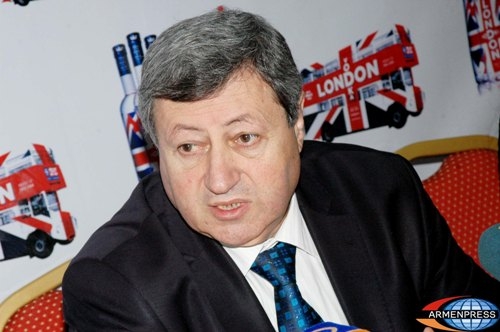


ArmInfo. The prospect of signing the Armenia-EU comprehensive and expanded partnership agreement is of concern to the Chairman of the Union of Domestic Producers of Armenia Vazgen Safaryan. "While Turkey is moving towards Russia, Armenia is looking towards the EU, a similar situation was observed in 1918-1920, as a result of which the Armenians lost Nakhijevan and the Kars region," he told journalists on November 13.
The head of the Union reminded that the Association Agreement with the EU was going to be signed by Armenia in 2013. "However, Armenian President Serzh Sargsyan, proceeding from the consideration that it is impossible to solve security issues within the framework of one system - the CSTO, and the economic ones - the EU, decided to integrate into the Eurasian Union," Safaryan said, saying that before the step towards the EU, for Armenia, which has the problem of the unresolved Karabakh conflict, is necessary to consider very seriously all the pros and cons."
According to Safaryan, unlike the year 2013, today the political realities are different. "If earlier the EU insisted on the position of "or, or" at this stage, it apparently revised its point of view, and the RA authorities introduced a new formula for interaction with the structure on the basis of the "and, and" principle, he stressed.
The expert will not dare to say that joining the Agreement for the Armenian economy will provide positive changes, as he sees no positive trends in the expansion of the range and volumes of the EU-exported products. In the Eurasian Union, as Safaryan noted, Armenia exports canned, agricultural and alcoholic products, to the EU countries - metal raw materials. To this day, according to him, it was profitable for Armenia to be part of the EAE also in the sense that the majority of citizens and their relatives, while working in the countries of the Union, provided inflow of transfers to the republic, due to which it was possible to mitigate the negative balance of the foreign trade balance of the country. "Already today, Armenia has provided exports at the level of $ 1.7 billion. By the end of the year, the figure will exceed $ 2 billion, thus fixing an annual increase of 20-21%," he said. At the same time, the expert believes that the main giants of the EU will not want Armenia to become a developed, industrial country, but would like to see only a raw material application of the EU in her.
According to the expert, if in the IT sphere Armenia can interest European partners, in terms of export of agricultural products the republic is not able to compete with European producers for the simple reason that 40% of agricultural production of these countries is subsidized by the states. Nevertheless, as the expert noted, Armenia, as a result of the expected agreement, can become a link for many countries. "In 1997, Russia proposed the creation of a free trade zone from Lisbon to Vladivostok, ensuring the free movement of goods, capital, services and labor." They returned to the topic last year in St. Petersburg at an economic forum, noting concern over its implementation in view of sanctions. I think in this context Armenia can become a platform for Russia, the EU, Ukraine and Iran," Safaryan said.
The Armenia-EU comprehensive and expanded partnership agreement is intended to replace the Association Agreement, which was agreed by Yerevan and Brussels, but they were not initialed, since in September 2013 Armenian President Serzh Sargsyan unexpectedly for many announced Armenia's decision to participate in the Eurasian integration, which, in fact, meant a disruption of the signing of the Association Agreement. Many analysts then suggested that the reason for the sharp change was the strong pressure from Moscow. However, official Yerevan did not admit this.